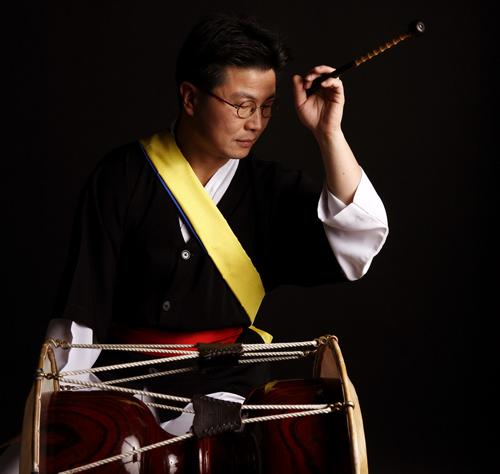
Dong-Won Kim hadn’t expected to end up in “big school,” as prison was known in South Korea. Sentenced initially for three years, the then 22-year-old would spend three months in solitary confinement before being released.
He learned a few things in that time, although maybe not what the big school authorities expected. Forgiveness, relationships and the power of music: those are the things that Kim brought out of his cell and that, decades later, have come together in his musical improvisation practice in Korea and here in Guelph this fall.
A percussionist and vocalist, he is improviser-in-residence this semester with U of G’s International Institute for Critical Studies in Improvisation (IICSI). His appointment is shared with Musagetes in Guelph and the Laurier Centre for Music in the Community in Waterloo, Ont.
Here in Guelph, Kim is working with local artists, including musicians, dancers and designers. He’s holding a series of improv workshops called “ding-dongs” at downtown arts venue Silence this fall and will hold a public performance in November.
He began exploring traditional Korean percussion as an engineering student at the University of Ulsan. He was 22 when a young worker was killed during a protest against the country’s dictatorship in 1987. Kim decided that not only would he attend the man’s funeral but he would also play his drum during the tribute.
The occasion erupted into another protest. This time, Kim was beaten, arrested and charged with unlawful assembly. Sentenced initially to three years, he spent three months in a four- by-six-foot cell – alone — under the 24-hour glare of overhead lights.
When his mother was permitted to bring him some books, the authorities allowed him only one volume of Confucian philosophy. “One sentence became an arrow to my heart,” says Kim. ‘“I am connected with every being in the world.’”
That line made him think about his relationships with others, including even the young police officer who had arrested and beaten him.
“After thinking about relating, I realized it’s me who has the strong poison in my heart,” says Kim. “If I am capable of forgiving him, that forgiveness could rescue myself from self-poisoning.”
Released from prison, he chose to look ahead.
The university had terminated his program, but Kim says he felt no regrets. “I didn’t want to return to technical engineering, I was very happy to be kicked out.”
Instead he picked up the drum again, not to protest but to learn. “My biggest influence and passion is playing music.” For much of that early learning he sought out music masters in various styles such as shamanistic and farmer drumming.
He’s now a professor in the Korean traditional performing arts department at Wonkwang Digital University.
“Korea is a land of drumming,” he says. Traditional percussion instruments include gongs and two kinds of drums — a jang-gu and a buk — both played with mallets.
Kim joined other musicians and learned to rely on his ear. Years later, his forte is musical improvisation demanding openness, listening, understanding, even compassion.
Those are the ideas that drive the IICSI and its predecessor — the Improvisation, Community and Social Practice (ICASP) project — led at Guelph by Prof. Ajay Heble, School of English and Theatre Studies.
Heble met Kim in 2010 when the latter was artist-in-residence at the University of Toronto. Last year, Heble invited Kim to play during the Guelph Jazz Festival; the relationship led to Kim’s current residency in Guelph.
A number of improvising musicians have come here for residency, says IICSI project co-ordinator Kim Thorne. Those stints are intended to help build artistic and community connections not just on campus but around the city.
Referring to this fall’s community workshops downtown, she says, “For someone not rooted here, he’s been fantastic about making connections, building community and sharing what he knows with the community more broadly.”
That’s the purpose of improvisation for Kim. Flexibility, awareness of others, trust in your colleagues: they’re all critical skills for musicians and for just about anyone. Tossing an imaginary ball from one hand to the other and back, he says, “If I listen to them, they will listen to me and respond to me. Great improvisers always allow you room.”
Kim will perform at the Co-operators Hall of the River Run Centre with the Guelph Symphony Orchestra Nov. 29.